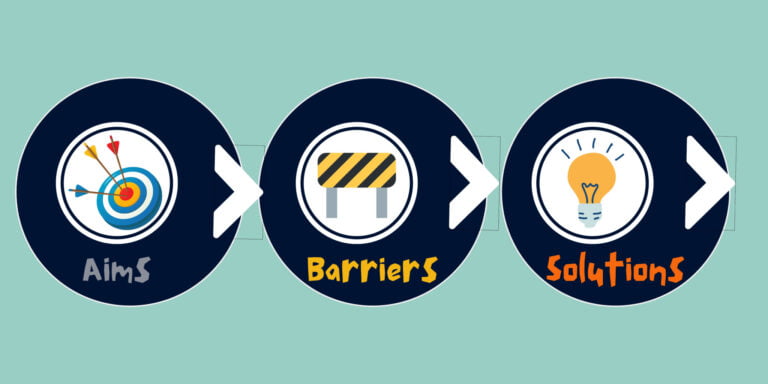
If you want to make a real difference in your place of work, implementing neuro-inclusive practices and working conditions can make a significant impact. Most of our workplaces are built on neurotypical working patterns and styles, which causes barriers for neurodivergent colleagues. Increasing people’s understanding and making adaptations to your work systems is key to providing support and improving the overall well-being of neurodivergent employees.
If you are a regular internet goer, you may have noticed the rise in neurodivergent awareness worldwide. Maybe you’ve already seen it in different areas of your life. This visibility has led to an increase in diagnoses in children and adults. Research suggests there are a greater number of undiagnosed adults than previously thought. However, there is still stigma, misconceptions, and stereotypes that neurodiverse people experience daily.
What is the difference between neurodiversity and neurodivergence?
There is a key difference between ‘neurodiversity’ and ‘neurodivergence’. Although technically everyone is neurodiverse, this does not mean that everyone is neurodivergent.
“Neurodivergence is the term for when someone’s brain processes, learns, and/or behaves differently from what is considered “typical”.” (RCN)
Some examples of neurodivergent conditions include:
- Dyspraxia (also called Developmental Coordination Disorder, or DCD)
- Dyscalculia
- Attention Deficit Hyperactivity Disorder (ADHD)
- Autism Spectrum Condition (ASC)
- Dyslexia
In the UK, 15% of the population is neurodivergent. 15-20% of the world’s population exhibits some form of neurodivergence.
Having neurodivergent staff is a blessing to organisations – new perspectives, fresh and innovative ideas, creativity and introducing new ways to problem solve are some of the many ways neurodiverse staff can enrich their place of work. Neuroinclusion should be implemented in all types of workplaces across the world.
Stigma and the social model of disability
“We need to admit that there is no standard brain” – Thomas Armstrong, The Power of Neurodiversity
In the 1980s, to reframe how people thought about disabilities, a group of activists developed the social model of disability. This model shows that disability is something that is created by society. “Disability is the result of the interaction between people living with impairments and an environment filled with physical, attitudinal, communication and social barriers”. (People With Disability, 2023). Neurodiversity falls under the social model of disability. Examples of where this is apparent are in barriers neurodivergent staff experience daily in their place of work such as stigma/discrimination plus employers lacking knowledge around neurodiversity leading to a lack of accommodations and communication barriers.
Neurodiversity movement
The neurodiversity movement materialised in the 1990s to increase awareness, inclusion and acceptance of everyone while embracing neurological differences. American sociologist, Judy Singer, coined the term ‘neurodiversity’ in 1998 to recognise that everyone’s brains develop uniquely and to promote equality and inclusion of “neurological minorities”. (Baumer, 2023) This was pivotal in shifting people’s use of deficit language and increasing awareness.
What can companies do to support neurodivergent staff?
In March 2023, Birkbeck, University of London’s Centre for Neurodiversity Research at Work found:
- Two-thirds of UK neurodivergent employees fear discrimination at work.
- 40% of participants felt there wasn’t enough knowledgeable staff to support neurodivergent workers.
- 65% of employers highlighted that they didn’t have enough knowledge to provide necessary support.
By learning in-depth about neurodiversity, employers will be better equipped to create a space where neurodivergent employees can thrive and feel valued. The key to an inclusive and productive workplace is embracing individual differences and providing a culture that doesn’t ignore but instead encourages.
Here are some ways in which you can nourish and support neurodivergent workers and their skills:
Train and educate teams on neurodiversity
Education helps teams to gain an understanding and empathy for their colleagues. Provide regular informative talks, workshops and training programs to help teams learn what neurodiversity is, their colleague’s strengths and challenges and how to make changes in their departments.
We have recently added a new training workshop called ‘Neuroinclusion in the Workplace’, which is designed to equip managers with the skills to hold supportive conversations, practice active listening and implement reasonable adjustments to their workplace. The aims of this training session are to:
- Gain a comprehensive understanding of neurodiversity, including key terms and common neurotypes, and recognize how these may present in the workplace.
- Define what constitutes a neuro-inclusive work environment and identify behaviours that either hinder or enhance inclusivity.
- Challenge and change perceptions of neurodiversity to reduce stigma and stereotypes through awareness and understanding.
- Promote empathy and understanding through real-life stories and the lived experiences of neurodivergent individuals.
- Equip managers with the skills to hold supportive conversations, practice active listening, and implement reasonable adjustments with practical ideas for accommodations to create a supportive and productive work environment.
Implement flexible working arrangements
Provide sensory-friendly work areas
Encourage feedback on communication
Look into your hiring process
A traditional interview scenario may not be the best environment for neurodivergent candidates. Consider adapting interviews to a person’s individual needs. For example, autistic candidates may find it difficult to recount an event in context, express their feelings through their tone of voice and make/maintain eye contact. You can adapt your interviews by not asking generalised questions, sending interview questions beforehand, making it clear it’s a safe place for stimming and avoiding the use of jargon.
Stigma plus a lack of knowledge and appropriate infrastructure have caused neurodivergent needs to not be recognised in the workplace. Encouraging understanding, empathy and inclusion are all vital to providing the best opportunities and environment for neurodivergent staff.
If you would like to find out further about our new neuroinclusion program, please contact us at 01484 310234 or get in touch via our website.
Zara Huxley



